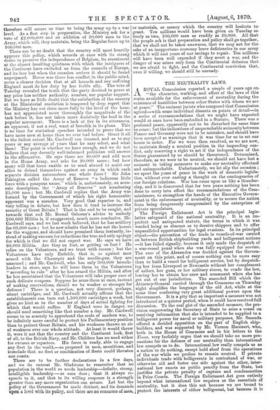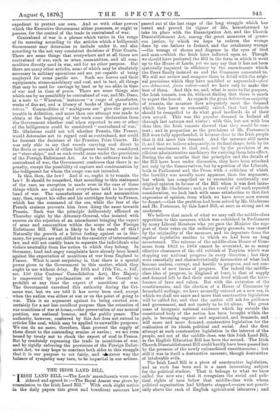THE NEUTRALITY LAWS.
AROYAL Commission reported a couple of years ago on "the character, working, and effect of the laws of this. realm available for the enforcement of neutrality during the existence of hostilities between other States with whom we are at peace." The eminent jurists who composed that Commissiow agreed—with some individual dissents on points of detail—in a series of recommendations that we might have expected. would at once have been embodied in a Statute. There was a profound peace, apparently not to be disturbed for some time to come; but the indications of unquenchable animositybetween France and Germany were not to be mistaken, and should have been accepted as warnings that it was time for us to set our- house in order. For we were then resolved, as we are now, to maintain firmly a neutral position in the impending con- flict, only reserving a right to act if the independence of the States guaranteed by us should be threatened. Determined, therefore, as we were to be neutral, we should not have lost a moment in taking measures to make our neutrality effectual and unimpeachable. Unfortunately, we let slip the occasion ; we spent the years of peace in the work of domestic legisla- tion, without ever casting a thought on the contingencies of our foreign relations. War has come upon us like a thunder- clap, and it is discovered that for two years nothing has been done to carry into effect the recommendations of the Com- missioners, to strengthen the hands of the Executive Govern- ment in the enforcement of neutrality, or to secure the nation. from being dangerously compromised by the enterprises of private speculators. The Foreign Enlistment Act is the principal legis- lative safeguard of the national neutrality. It is an im- perfect and antiquated statute, the terms in which it was worded being so obscure as to deceive shippers and to offer unparalleled opportunities for legal evasions. In its principal object—the prevention of the trade in vessels-of-war carried on between British shipbuilding yards and belligerent nations- -it has failed signally, because it only made the despatch of a war-vessel penal when she was fully equipped for service. The case of the Alexandra was decided against the Govern-. meat on this point, and of course nothing can be more easy than to build a vessel for belligerent service, but by despatch- ing her from Liverpool or Newcastle without her complement of sailors, her guns, or her military stores, to evade the law, leaving her to obtain her crew and armament when she has, got out of our jurisdiction. The amended Bill which the Attorney-General carried through the Commons on Thursday" night simplifies the language of the old Act, while at the- same time conferring very great additional powers upon the Government. It is a pity that so important a measure was not. introduced at a quieter period, when it could have received full discussion. To the real gist of the amended measure, the. pro- vision empowering the Secretary of State to seize a vessel on- receiving information that she is intended to be supplied to a belligerent power for naval or military purposes, Mr. Samuda. offered a decided opposition on the part of English ship- builders, and was supported by Mr. Vernon Harcourt, who,. both in the House of Commons and in his letters to the. Times, very foolishly urges that we should take no more pre- cautions for the defence of our neutrality than international law compels us to do. International law really compels us as. a nation to do nothing, except hold aloof from the operations. of the war while we profess to remain neutral. If private individuals trade with belligerents in contraband of war, or otherwise aid and foster one side against the other, inter- national law exacts no public penalty from the State, but justifies the private penalty of capture and condemnation in Prize Courts. The Foreign Enlistment Act goes entirely beyond what international law requires as the essentials of neutrality, but it does this not because we are bound to protect the interests of either belligerent, but because it is expedient to protect our own. And so with other powers which the Executive Government either possesses, or ought to possess, for the control of the trade in contraband of war. Contraband of war is a phrase which varies in the range of its meaning according to the articles which a belligerent Government may determine to include under it, and also according to the not very consistent decisions of Prize Courts. There are some things that everywhere and at all times are contraband of war, such as arms, ammunition, and all com- modities directly used in war, and for no other purpose. But there are many other articles, some of which may be absolutely necessary in military operations and are yet capable of being employed for some pacific use. Such are horses and their equipments, steam-machinery and coal, and in fact, all things that may be used for carriage by land or by sea alike in time of war and in time of peace. There are some things also which can by no possibility be contraband of war, and Mr. Dana, in a note to "Wheaton," instances "a cargo of pianofortes, works of fine art, and a library of books of theology or belles lettres." Commodities of "ambiguous use" give the greatest trouble in definition, and more than one attempt was made to obtain at the beginning of the week some declaration from the Government whether coal when exported to one or other of the belligerents could be considered "contraband of war." Mr. Gladstone could not tell whether Prussia, like France, would determine not to regard coal as contraband, nor could he forecast the decisions of the Prussian Prize Courts. He was only able to say that vessels carrying coal direct to the fleets or arsenals of either belligerent would be considered as "store-ships," and as such would come under the provisions of the Foreign Enlistment Act. As to the ordinary trade in contraband of war, the Government confesses that there is no penalty, except the possibility of capture and condemnation by the belligerent for whom the cargo was not intended.
Is this, then, the law ? And if so, ought it to remain the law ? It should be remarked, that according to this statement of the case, no exception is made even in the case of those things which are always and everywhere held to be contra- band of war. The manufacturer of arms and ammunition may, then, export his rifles and his cartridges freely to France, which has the command of the sea, while the fear of the French cruisers prevents him from doing the same towards Prussia. Such was the principle deliberately affirmed on Thursday night by the Attorney-General, who insisted with success on the rejection of an amendment bringing the export of arms and ammunition within the scope of the Foreign Enlistment Bill. What is likely to be the result of this ? Naturally the growth of a bitter feeling against us in Ger- many, for peoples are not skilled in the casuistry of international law, and will not readily learn to separate the individuals who violate neutrality from the nation to which they belong. In Germany, loud and angry complaints have already been heard against the exportation of munitions of war from England to France. What is most surprising is, that there is a special power given to the Government in this matter, which they ought to use without delay. By 16th and 17th Vic., c. 107, sec. 150 (the Customs' Consolidation Act), Her Majesty is empowered by proclamation or order in Council- to prohibit at any time the export of munitions of war. The Government exercised this authority during the Cri- mean war, but we are told it has never been used, except when the nation was either at war or on the point of going to war. This is no argument against its being exerted now, certainly for a not less excellent purpose than the retention of our munitions of war at home,—the preservation of our neutral position, our national honour, and the public peace. The authority, however, conferred by this Act does not extend to articles like coal, which may be applied to unwarlike purposes. We can do no more, therefore, than prevent the supply of these direct to the contending armies or navies ; we are even bound by treaty not to cheek the export of coal to France. But by resolutely repressing the trade in munitions of war, and by rigidly enforcing the provisions of the Foreign Enlist- ment Act, we may hope to convince both sides in this struggle that it is our purpose to act fairly, and vaikatever way the balance of sympathy may turn, to be impartial in our actions.































 Previous page
Previous page